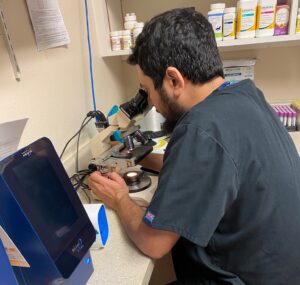
What We Do
When your pet receives regular wellness exams, vaccinations, proper dental care, and screening for common diseases, he or she has a much better chance of living a long, healthy and happy life.
At Edgfield Animal clinic, we place a strong emphasis on preventive care, but despite our very best efforts, a beloved pet may still develop an illness or be injured. Our internal medicine and surgical expertise, as well as advanced diagnostics, ensure that your pet will receive a quick and accurate diagnosis. We will then explain that diagnosis to you as well as the various treatment options.
Please take a look at the services we offer and learn why we believe they are important to the care and well-being of your pet.
Choose How You Want Us to Care for Your Pet!
Wellness Care for your Pets
Prevention is the key to your pet's long term health. This approach also minimizes the lifetime cost of care. We recommend routine wellness exams, vaccinations, regular lab work, as well as medications to prevent heartworm, fleas and ticks.
Most tests can be done during your dog or cat's regular exam. This is our chance to get to know your pet, assess his or her overall health, discuss any changes we see, educate and update you on advances in veterinary care, and for you to bring up any concerns or questions you may have.

Our Services

-Examine your pet’s teeth, throat, and oral cavity
– Check your pet’s vision and examine the eyes
-Examine the ears for infection, ear mites, allergic reaction and other related health issues
-Examine your pet’s respiratory system
-Assess your pet’s heart
-Test your pet’s reflexes
-Palpate lymph nodes and abdomen
-Inspect the skin
-Palpate joints and muscles for arthritis and other orthopedic conditions
-Tests to evaluate the function of internal organs, blood, and other systems
A complete physical should include a full blood workup. Not only can a full chemistry panel and complete blood count identify the presence of underlying disease processes, but these tests help create a baseline should your pet become ill between routine examinations.
Additionally, blood work is necessary if we recommend a dental cleaning, removal of a skin mass, or any other procedure that requires anesthesia.
We also recommend complete blood testing annually for all pets over the age of seven.
Blood work results are available the same day to start early treatment of your pet.
We strongly recommend that your pet is up to date on his or her vaccines.
Vaccinations are not only safe and effective, they are an important and fundamental aspect of your pet’s preventive healthcare plan. Diseases that once were relatively common and fatal to pets are now easily preventable. There are also vaccines – such as for rabies and other zoonotic diseases – that help protect your family from very dangerous illnesses. Veterinary science is constantly improving on existent vaccines as well as increasing our ability to prevent an even wider array of contagious diseases.
We tailor our vaccination protocol according to the lifestyle of your pet, as well as to the diseases your pet is most likely to be exposed. During your kitten or puppy’s first year of life we also spread out the series of vaccines to reduce the strain on his or her developing immune system. These series of vaccinations provide the best protection from disease as well as reduce the possibility of your pet having an adverse reaction to a vaccine.
We recommend vaccinating puppies at 6-8 weeks, and vaccinating every 3-4 weeks until the age of four months. Core vaccines for dogs are: Distemper, Parvo, Cornavirus, Leptospirosis, Hepatitis, Parainfluenza, and Rabies.
Non-core vaccines strongly recommended are: Bordetella,influenza and Lyme if you are traveling to a tick-infested areas.
For cats: Rhinotracheitis, Calicivirus, Panleukopenia, Chlamydia, and Rabies.
All too often a pet that has run off fails to return home. This is a terrible situation. We have all seen the sad lost pet notices posted on telephone poles. Getting lost is the number one cause of pet death.
Studies have shown that more than a million pets get lost each year and about 90 percent will not be returned to their owner unless they have some form of permanent lost pet identification.
This is why we at Edgefield animal clinic view microchip pet IDs as a standard of care for all of our feline and canine patients. With a microchip, your pet can be identified quickly and easily by animal control officers, shelters, or veterinary hospitals.
Veterinary X-rays have become a powerful and useful tool. They assist us in diagnosing a wide range of medical conditions. This is a service we provide in-house.
You may have heard that it is possible to add years to your pet’s life with proper dental care. True, but you will also increase his or her health, vitality and wellbeing. In short, proper dental care will help ensure your pet leads the best life possible.
However, if left untreated, dental disease can not only be painful and inhibit proper nutrition, but it can also lead to serious systemic issues that may threaten your pet’s health before symptoms are noticeable. For example, oral bacteria that enter the bloodstream can damage your pet’s kidneys, heart or liver.
Despite the importance of proper dental care, dental disease is often overlooked by many pet owners across the country. It is estimated that more than 80 percent of dogs and 70 percent of cats develop tooth and gum disease by the age of three years.
Veterinary dental care is an important piece of your dog or cat’s preventative health care program. It will not only prevent dental and systemic disease, but in also help minimize the lifetime cost of care for your pet.
The centerpiece of good dental care is a complete oral exam followed by a thorough cleaning. Dental cleanings include ultrasonic scaling followed by polishing and a mouth rinse, the combination of which is designed to remove plaque and slow its buildup.
Should we find any issues, such as evidence of gum or tooth decay, gingivitis, or excessive plaque buildup, we will discuss treatment options with you. We offer a number of dental procedures and oral surgeries. For more complicated or severe cases, we may refer you to a board certified specialist.
We offer:
* Oral surgeries
* Prophylaxis
* Extractions
* Ultrasonic scaling for cleanings
Dental care is not something that can be left to periodic visits with us. Because plaque buildup – the primary cause of poor oral health – is a gradual process occurring throughout the life of your pet, it is important to practice good home dental care.
As with people, this means regular tooth brushing and in some cases additional steps may be necessary. Any member of the our staff can show you the proper method for caring for your pet’s teeth as well as help you select the most effective dental products for your pet.
You should also be able to recognize the signs of poor oral health. If you notice any of the following you may want to call our hospital:
* Persistent bad breath – one of the first signs of dental disease
* Tartar or plaque buildup (ask your veterinarian how to identify these)
* A yellowish-brown crust of plaque on the teeth near the gum line
* Red and swollen gums
* Pain or bleeding when your pet eats or when the mouth or gums are touched
* Pawing at the mouth
* Decreased appetite or difficulty eating
* Loose or missing teeth We understand that the decision to allow your beloved companion to undergo surgery is never an easy one. We strive to ensure your pet’s procedure is as comfortable and stress-free as possible.
Soft Tissue Surgery
We offer a range of soft tissue surgeries that include, but are not limited to:
* Spays and Neuters
* Bladder Stone Removal
* Mass Removals
* Cesarean section
* Laceration repair
* exploratory laparotomy
* Orthopedic surgery procedures we perform in-house include:
* Minor Fracture Repairs
* IM Pinning
* Limb Amputations
Surgery
Dr. Ali is a trained, skilled and experienced veterinary surgeon. He approaches this aspect of his profession with a deep sense of compassion for all animals. Dr. Ali has more than 12 years’ experience in the veterinary field.
Perhaps the most important pre-surgical step we take is to discuss with you why we believe a particular procedure is necessary and what it entails. We also provide information on proper postoperative care and answer any questions you may have so that you feel comfortable knowing you are making the right choice for your pet.
We believe it is in the best interests of our clients’ pets for us to offer as wide an array of surgical services from our facility as possible. It is important for you and your pet to receive care in a friendly and welcoming facility from people you both have come to know in order to reduce stress and promote healing.
Soft Tissue Surgery
We offer a range of soft tissue surgeries that include, but are not limited to:
* Spays and Neuters
* Bladder Stone Removal
* Mass Removals
* Cesarean section
* Laceration repair
* exploratory laparotomy
* Orthopedic surgery procedures we perform in-house include:
* Minor Fracture Repairs
* IM Pinning
* Limb Amputations
Anesthesia & Monitoring
Ensuring the health and safety of your pet during surgery is of the utmost importance to us and requires an anesthetic and monitoring regimen that adheres to the highest principles and ideals of veterinary medicine. We utilize a multi-parameter monitoring and anesthesia care system.
At Edgefield, your pet will be cared for with the highest-quality anesthetic administration and cardiovascular monitoring protocols by our skilled professionals. We use Isoflurane one of the safest anesthetics available.
Prior to surgery, your pet will be examined and a pre-surgical blood screen will be performed. The results of these tests and your pet’s past anesthetic history, breed, preexisting conditions, and age will be used to create an individualized anesthesia protocol for your pet.
While under anesthesia your pet will be cared for by a well-trained and experienced veterinary technician using our monitoring system, which tracks blood pressure, heart rate, respiratory rate, body temperature, and oxygen level.
Pain Management for your Pet:
We all know that pain hurts, but pain also has many other detrimental effects on the body.
Pain slows healing, decreases activity, and causes behavioral changes (such as aggression, anxiety, and depression). Pain worsens diseases like arthritis and potentially some cancers. It interferes with the bond between you and your pet.
As your pet is being discharged from the hospital, we provide you with detailed information on how to properly care for your pet at home after surgery. We are also happy to answer any questions or concerns that you may have once your pet has returned home.
When to Seek Emergency Veterinary Care
The easiest answer as to whether you should seek emergency care for a pet is when you feel his or her medical condition is serious and cannot wait. However, the following general situations should help you determine if you need to seek out emergency care for your pet:
* Difficulty breathing
* Acute abdominal swelling
* Electric shock
* Excessive vomiting or diarrhea
* Excessive bleeding
* Excessive coughing
* Exhibits symptoms of heat stroke
* Repetitive and prolonged seizures
* Snake bites
* High or low temperature (more than 104 or less than 100 degrees)
* Unable to urinate or defecate
* high or low blood Glucose.
